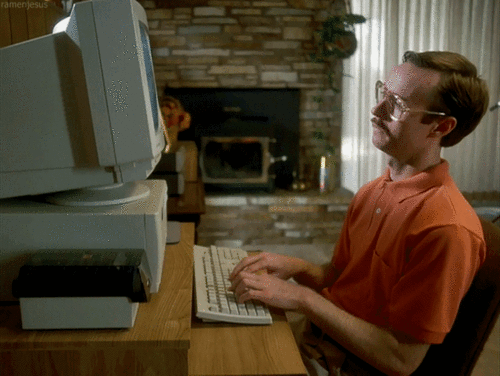A couple of months ago, I was chatting to a developer at work about how I’ve always wanted to learn to code but never tried.
Coding always seemed like one of those skills that was incredibly powerful (hence the allure). At the same time coding felt hugely complicated and foreign.
Ever since I was an art student in college, coding, in my mind, always see-sawed between being geeky and glamorous. Glamorous because if you knew how to code that meant you were smart and successful. And geeky because, well, most depictions of programmers in popular culture look like this…

As a girl growing up in Dublin, I assumed you had to be ‘naturally good’ at computers to understand coding.
But I’ve learned that there is no such thing as ‘naturally good.’
The Difference Between Techies & Non-Techies
As a non-programmer, everything to do with tech, for the most part, seems foreign, complex and very difficult to grasp. There’s so much of it, and that becomes overwhelming.
This is exactly where the divide between ‘techies’ and ‘non-techies’ pops up. I’ll use myself as an example here:
When I’m trying to figure something out on my computer — let’s say, how to customize a new application — I’ll try hard at first by focussing on this one problem. I’ll focus on it so much that I also end up focussing on a single solution, over and over again.
Then I’ll get frustrated, then feel bad because I can’t figure it out, and then give up.

But when my partner tries to figure something out, he’ll do this:
- Test something out
- Google again
- Test something out again
- Watch a few youtube tutorials
- Read through some forums
- Test something again
And usually, he’ll solve the problem. (And when he doesn’t, he’s not as frustrated as I usually am.)
I used to think he ‘got it’.
But actually he was curious (like me), and patient (not so much like me). It seems so obvious now. For a long time, I succumbed to thinking that we were two completely different types of people.
I was wrong.

The Intimidation Game
I’m 29, a woman, grew up in Dublin, studied art in college, moved to London to do an MA in writing, where I now live and work. And even though I never considered myself a ‘techie’ person, I’ve always been curious about programming.
I’ve also, always, felt too intimidated to try it.
All I’ve ever known about coding was what I saw in films and TV growing up in Ireland in the early 2000s. I watched nerdy archetypes in movies type at lightning speed, read nonsensical symbols in strange interfaces and hack into the system’s mainframe.
Suffice it to say, I never identified with these characters. And so, unsurprisingly, never thought of myself as someone who could do it.
Why Now?
Cut to 10 weeks ago. I’m chatting to the developer at work about all this alluring code stuff. She tells me about Codebar. It is a weekly meetup aiming to diversify the tech industry. Codebar organizes free coaching sessions for people underrepresented in tech.
Sounded like the thing — a place to learn to code that’s designed to welcome complete newbies like me. So I thought, sure why not?
Great Expectations
I went along to this meetup telling myself to be ‘realistic’ about what I wanted to achieve. You see when it comes to picking up new hobbies, I often have trouble managing my expectations. Most of the time I don’t have enough patience to wait for my skill set to level up to my enthusiasm. I get distracted by something else and the whole thing often fizzles out.
So walking in I said to myself, “Just take it one problem at a time. Don’t start telling everyone you want to become a developer.”
But here’s the thing: I want to become a developer.

I Want More
I’ve spent the last 10 weeks learning the most basic HTML and CSS and using it to build my first ever website (right now I’m experiencing the unprecedented joy of browser testing, so we’ll see how that goes later).
For any other complete beginners out there, I highly recommend the Codebar tutorials for a basic introduction. I recommend Flexbox Froggy for learning some cool front end displays. I recommend CSS Diner for learning everything there is to know about selectors.
And while it is crazy difficult and there are constantly so many new problems that I had no idea were lurking in the margins, there really is no high like figuring out why some code doesn’t work and then fixing it. My synapses go crazy every single time, and I love it.

For every problem I’ve come across, I try to be patient while figuring it out. Now I google, and test, and read through forums. I ask lots of questions even if I think they’re stupid because you know what? Who cares. I’m new at this.
What’s The Point?
My goal now is to become a developer in 6 months’ time.
Why 6 months? Because that happens to be when my work frees up. And if other people can do it, so can I, damnit. Just because I didn’t study computer science and didn’t know what Github was until a few weeks ago (still figuring that one out in full, to be honest), doesn’t mean I can’t get there eventually.
If you take one small problem at a time, you can manage it. And if you have kind people around you who are willing to help, all the better (and from my experience so far, the industry doesn’t have any shortage of this ❤).
As a complete code newbie, I’ll be documenting my journey on Medium from here on out. I will share the kinds of experiences and perspectives that I want others to share with me.
Hopefully, it will help other newcomers like myself realize that there are not just 2 types of people out there: those who just get it and those who don’t.
For me, this is lesson number one.
